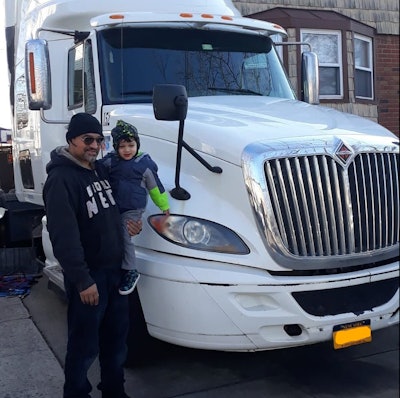
Mike Boston has been in trucking for 15 years, the last five of which have been in general freight after a transition from the household goods moving segment. He and a business partner own WM On Time Logistics LLC, based in East Stroudsburg, Pennsylvania. They own and operate five trucks and trailers themselves and currently have 10 owner-operators leased on.
Boston started a private Facebook group, Owner Operators/No Authority/New Authority, about a year ago with the goal of helping new owner-operators find their footing in the industry, and as of March 14, the group has grown to nearly 23,000 members.
That group is now the headquarters of sorts for a movement demanding better rates on the spot market, particularly from large brokerages.
That idea took hold in the last few weeks after conversations with representatives from J.B. Hunt’s Power-Only Carriers program, which Boston said was offering rates too low for him to move his trucks. An email thread between Boston and a J.B. Hunt rep featuring discussions to that effect was inadvertently sent by the rep to his full carrier list -- many of the unwitting recipients jumped quickly to Boston’s defense.
One of the carriers reached out to Boston directly with an idea that “if [carriers] boycotted one of these large brokers every day one at a time, we might be able to get some change with these rates,” Boston said. “He said he’s been trying to do this for years,” but he didn’t have the platform. That’s where Boston’s Facebook group came in, which at the time, around the beginning of March, had just shy of 20,000 members.

“I made a post in the group about our intentions, and we got a lot of positive responses, people telling their stories,” he said, particularly about one of the largest brokerages.
[Related: More freight fraud inbound? Pessimistic rates outlook sets the stage]
On March 6, Boston and his Facebook group began a boycott of Total Quality Logistics (TQL), which Boston said members of the group, himself included, had bad experiences with -- and more than just low rates: “Stealing money, lowballing loads, charging for repairs to trailers they don’t own, things like that.” The group also started a boycott of J.B. Hunt's brokerage as of Tuesday, March 14. Attempts to reach TQL and J.B. Hunt for comment have gone unreturned as of Tuesday afternoon.
Boston said his most recent experience with TQL, which helped spur on this effort, was an email from the company noting “they were going to file a claim against my cargo insurance for maintenance on a trailer I borrowed from them for about four or five days,” he said. “They hit me with a bill for $1,083, and they told me they’re not going to give me any more loads, and they’re going to take the money out of the money that they owe me to pay for that maintenance claim.”
The claim, Boston said, was for brakes. “I said I only had the trailer for four days,” he said. “They said, 'Yeah, well, you’re paying for this.’” Boston’s Facebook group is filled with posts from carriers telling similar stories about being hit with cargo claims and other charges.
“There’s more of us out here together than divided,” Boston said. “We’re setting our intent, and we’re not going to stop until TQL closes its doors. That’s basically the bottom line.”
[Related: Beware what you sign with brokers: Freight-payment offsetting of cargo claims a 'sucker's game']
Boston added that a big source of carriers’ issues with brokers is the lack of transparency into the financials of a load.
“These guys are hiding behind ‘market rates,’” he said. “They are the market. The shipper and the broker are the market. They’re in total control of what we’re making on these loads. They know what is in those loads. The shipper and the broker are the only two parties in this three-party transaction that know exactly what’s in these loads, and they’re hiding those numbers from us so we don’t know what to offer. We know what we want to get, but we don’t know what’s there,” thus no power to know when a rate offer is realistic, despite federal rules that allow all freight transaction parties access to the all details.
Besides basic greed on the part of brokers, Boston also placed blame on the government for allowing freight brokers to get “out of control.”
“This is a government issue," he said. "The government gave them their authority, and when the government gave them their authority, they gave them the authority to rip us off. We don’t know what else to do.”
[Related: Broker transparency update: OOIDA pushes FMCSA for status]
He said what's happening in the market today feels like a distortion abetted by competitive collusion, of a fashion. One broker determines they’re only going to offer a low rate, and the rest of the brokers fall in behind them. “They know what they’re doing,” Boston said. “They’re getting together and standing on these rates on purpose. When the big guys do it, the little guys fall in.”
Boston argued that freight brokerages need to be regulated like Wall Street stock brokers were regulated in the 1990s after the penny stock pump-and-dump schemes blew up in the 1980s. Unscrupulous stock brokers at the time used a variety of schemes to perpetrate widespread fraud and abuse by trading in low-priced securities known as penny stocks. The government eventually stepped in on those schemes, with Congress enacting the Penny Stock Reform Act of 1990, which provided the Securities and Exchange Commission (SEC) with additional rulemaking authority and ability to sanction individuals involved in penny stock fraud and abuse.
Since the last time the bottom fell out of the freight spot markets, in the early pandemic period in 2020, “I think the government has forgotten about this situation” in trucking, he added, “or they just don’t care. We have no control over our income. Yes, we can know our cost per mile; we can know what we want to get paid for a particular load. But none of that means anything if the guy with the load won’t give it to you if you won't do it for his set price.”
Boston has planned the TQL-related effort to continue through April 6. Since starting it, he said he's noticed some uptick from TQL in calls to carriers that were previously removed from their system, email blasts looking for carriers to haul freight, and more.
“We want to see more than that,” he said. “We want to see rates come up. If that doesn’t happen, we want to see the effects of the protest, and that’s when we may consider slowing it down. If it takes longer than a month, then it takes longer than that.”
Boston said he knows by being front-and-center of the protests and boycotts, his business is likely to suffer.
“I know I’m going to lose a lot of business over this. I know I’m going to get hurt," he said. "Me and my partner were talking; I know I’m probably destroying us, but I have no choice. TQL has already made it clear they’re not doing business with me ever again. I haven’t checked my Carrier 411 lately, but I know the other ones are probably going to blacklist me, too. It was worth it to me, and I’m going to keep going.”
Boston has also considered the legality of boycotts targeting specific companies, as "group boycotts" can run afoul of federal antitrust laws. Boston said, however, he and his group feel "that we will be on the right side of history.
"For years brokers have been lowering rates as a conglomerate to steal from us, and we have had enough," he said. "We are not forcing anyone to join us; they are all voluntarily choosing to not haul for certain brokers like TQL and J.B. Hunt. As owners we have to make these choices every day about who we will carry loads for. We will let the American people see what we are going through, and we will let them decide if starving us is fair while mega brokers make millions."
[Related: Carriers believe broker regs proposal a step 'in the right direction']









